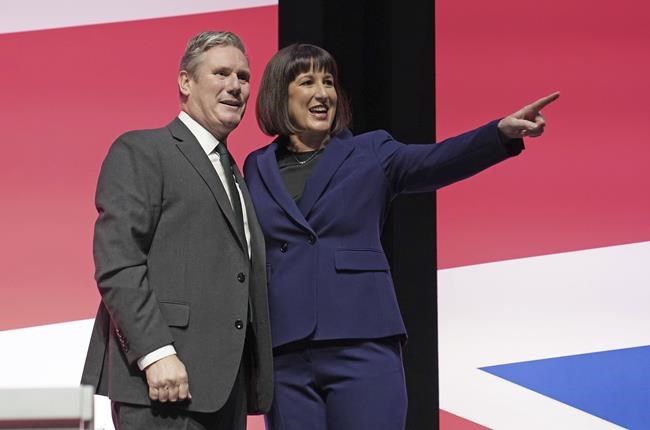LIVERPOOL, England (AP) — A protester has managed to evade security and disrupt a speech by British opposition Labour Party leader Keir Starmer.
Starmer was showered with glitter as a protester shouted “True democracy is citizen-led” at the Labour conference in Liverpool.
The protester was bundled offstage and Starmer continued his speech after removing his suit jacket.
THIS IS A BREAKING NEWS UPDATE. AP’s earlier story follows below.
LIVERPOOL, England (AP) — U.K. Labour Party leader Keir Starmer delivers a speech on Tuesday that amounts to a public job interview for the post of prime minister. He'll set out to answer the question in many voters’ minds: Why Labour?
Starmer is addressing the opposition party's annual conference, likely the last before a national election next year. He needs to persuade voters fed up with economic stagnation and political turmoil to switch allegiance to his party, which has been out of office since 2010.
He plans to pledge “a decade of national renewal,” after what he depicts as 13 years of decline under the Conservative Party.
“What is broken can be repaired, what is ruined can be rebuilt,” Starmer will say, according to the party.
Starmer’s speech in Liverpool at a conference that has been overshadowed by violence in Israel and Gaza is a key moment for a politician who has managed to unite a fractious party and gain a substantial lead in opinion polls but remains a blank slate to many voters. A barrister and former head of the national prosecution service, he’s widely seen as managerial and a bit dull.
Labour has lost four straight national elections. Its landslide 1997 election victory under Tony Blair — the peak of its popularity — was a quarter-century ago and in the last election, in 2019, voters handed Labour its worst drubbing since 1935.
Since then, Britain has been through the COVID-19 pandemic, left the European Union and absorbed the economic shock of Russia's invasion of Ukraine, all of which pushed U.K. inflation above 11% late last year.
Voters are weary from a cost-of-living crisis, a wave of public sector strikes and political turmoil that saw the Conservative Party dispatch two prime ministers last year — Boris Johnson and Liz Truss — before installing Prime Minister Rishi Sunak to try to steady the ship.
With an election due by the end of 2024, polls put Labour as much as 20 points ahead of the Conservatives.
Starmer, elected leader in 2020, steered the social democratic party back toward the political middle ground after the divisive tenure of predecessor Jeremy Corbyn, a staunch socialist who advocated nationalization of key industries and infrastructure.
Starmer also repaired relations with Britain's Jewish community and vowed to root out antisemitism that's alleged to have tainted the party under Corbyn, a strong supporter of the Palestinian cause.
Labour leaders have condemned Saturday's Hamas attack on Israel, and led delegates in a minute of silence for the victims on Monday.
Starmer’s move to the center has angered some grassroots Labour members who want a bolder agenda, but it has revived the party’s poll ratings and put a spring in the step of conference delegates.
Underscoring the way the party has changed, Starmer plans to say he leads “a changed Labour Party, no longer in thrall to gesture politics, no longer a party of protest. … Those days are done. We will never go back.”
In a sign that corporate Britain is warming to Labour, companies thronged to the conference in The Beatles' birthplace of Liverpool, buying space in the exhibition hall, sponsoring panel discussions and attending a business forum with party leaders. The mood was noticeably buzzier than at the Conservatives’ muted conference last week in Manchester.
The next election will be fought against a challenging economic backdrop of high interest rates and low growth. The International Monetary Fund projected Tuesday that the U.K. will see the weakest economic growth among the Group of Seven leading industrial nations next year, at just 0.6%.
That leaves Labour trying to walk a delicate line. Party leaders want to persuade voters it can ease Britain's chronic housing crisis and repair its fraying public services, especially the creaking, state-funded National Health Service — but without imposing tax increases on the public.
Labour economy spokeswoman Rachel Reeves told the conference on Monday that a Labour government would “tax fairly and spend wisely,” using economic growth to fund public services and boosting investment through a new national wealth fund. She pledged to build 1.5 million homes to ease Britain’s chronic housing crisis and repair the creaking, overburdened state-funded National Health Service.
Former Cabinet minister Peter Mandelson, one of the architects of Blair’s election victories, said Starmer has to “make an offer the country feels it can’t refuse.”
“At the moment people are cynical about the difference any government can make,” Mandelson told the Associated Press. "He’s got to give them hope mixed with realism.”
___
Associated Press writer Pan Pylas in London contributed to this story.
Jill Lawless, The Associated Press




